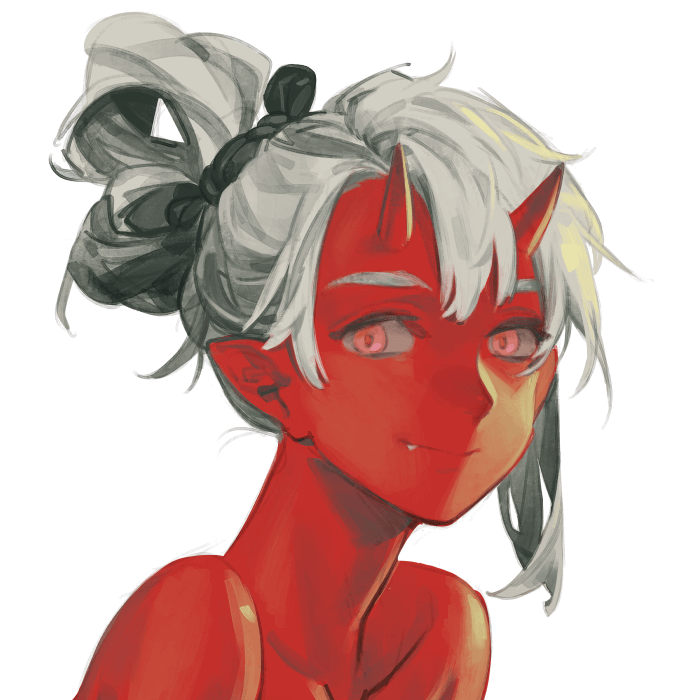Twenty years ago, Setsuna and Touma arrived in a remote farming hamlet, Setsuna already heavily pregnant. They told everyone they were siblings, but most locals assumed Setsuna was pregnant with Touma's child - only to be surprised when her baby had the inhuman colour and horns of an oni. In most places, this would have been an ill omen and they'd have been shunned at best, but this hamlet was a safe haven for those that wanted to disappear: fugitives, the disgraced, and even those with shameful bloodlines themselves, so they were tolerated. Setsuna and Touma settled into a life of hunting and farming, while the baby was named Jihi.
Whatever the adults thought of Jihi did not extend to their children, and growing up, she made friends easily and eagerly. Clever and curious, she was always getting into mischief with the other kids, and her sheer talent for that mischief caused some to suspect she was destined by blood to follow a dark path - but that suspicion was wasted. Though she enjoyed being "special" - sneaking around in the dark, playing with her sorcery, impressing other kids by holding her hand over a lit candle - she never thought of herself as anything but human in her soul, and loved all the common folk in the hamlet she called home. As she grew older, she also came to love one of the hamlet's traditions: the stage. Many of the hamlet's reprobates and fugitives had stories to tell, and would do so with barely-obfuscated plays, so much of the hamlet's few spare resources went to a humble theater. Jihi threw herself into her roles; sometimes playing an ordinary woman, sometimes playing a fierocious oni, always doing so with shameless, unrestrained passion.
Jihi was also shameless, unrestrained, and passionate in another way. As she sexually matured, many in the village wanted to claim Jihi as a sexual conquest. Only after they had bedded her did they realize that there was no "conquering" involved. Jihi fell into bed readily, with both boys and girls, seeing her sexuality not as a prize to be hoarded but a gift to be shared freely. Of course, this is a mindset formed from her upbringing in a tiny community where everyone knows and is friendly (if only by necessity) with each other; as she's never left the boundaries of her hamlet, she is unprepared for the exploitation and degradation of the wider, less familiar world.
The violence of the outside world came recently to the hamlet. Raiders, accompanied by monsters Jihi had never heard of, came to ravage the community, but were met by Jihi's mother, Setsuna. She carried weapons that Jihi had seen in the house but never seen used. No one had ever seen them used like this. Setsuna's movements flowed naturally, instinctively, striking and parrying when her opponents were still thinking of striking and parrying. On that day, Jihi realized she knew almost nothing of her mother, that she had a past before the hamlet that Jihi had never even thought to ask about.
Setsuna's skills were incredible - but she was also in her forties, and out of practice by twenty years. Though she fought the invaders back, she was mortally wounded by weapon, claw, and poison. Jihi eavesdropped as she whispered instructions to Touma to carry her ashes back to her homeland. She whispered things Jihi lacked the context to understand, references to events there that forced her to leave, frustratingly vague. And she whispered another thing: "Jihi cannot know." There was so much about her mother that Jihi did not know. There was so much she didn't know about Touma, too, for that matter - but she did know he was middle-aged, overweight, lame from a knee injury in the rice paddies years earlier. There was no way he could make the journey. She couldn't let him.
There was something else, too. A more selfish reason: Jihi had missed the chance to learn about her mother when she was alive. Maybe, via this journey, she could understand more of the mother she'd lost. Maybe it would ease the raw, vicious pain she felt inside her, knowing that she was gone. That is why Jihi stole the sealed, iron urn containing her mother's ashes, along with other supplies; why she wrote the tear-stained note for Touma to find, telling him she loved him and to tell everyone in the hamlet the same; why she slipped out of her house in the black of a moonless night, leaving the only home she's ever known and entering into the unknown.
 Your support makes Blue Moon possible (Patreon)
Your support makes Blue Moon possible (Patreon)

